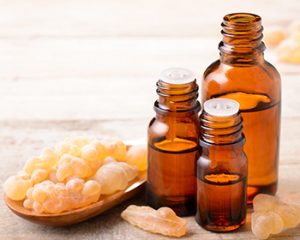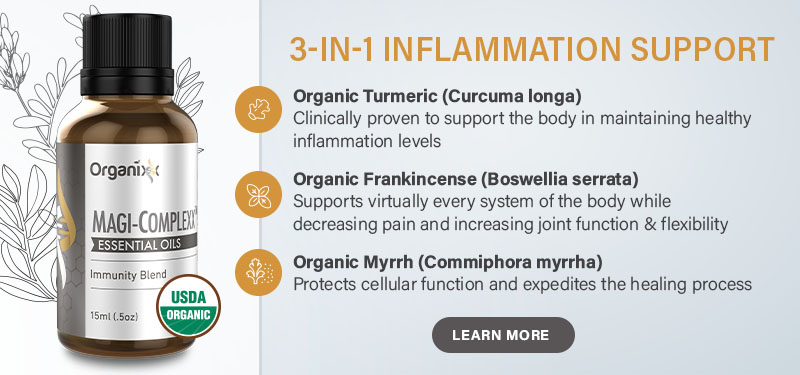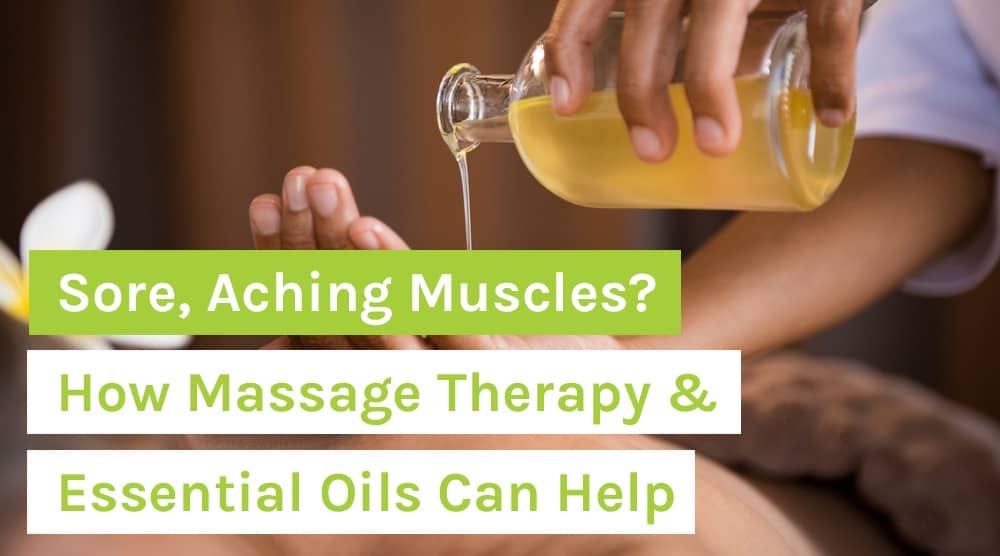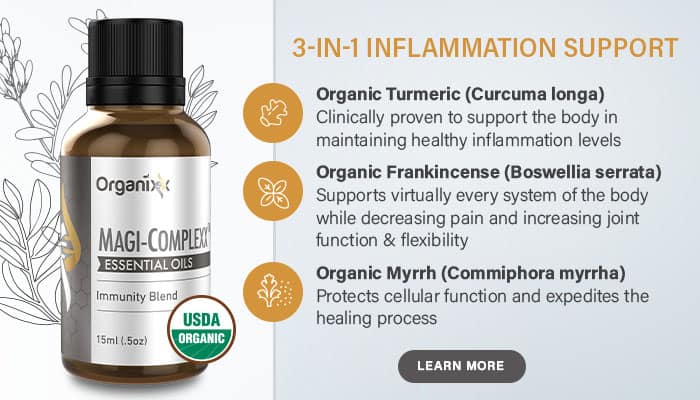Sore, Aching Muscles? How Massage Therapy & Essential Oils Can Help
In a hurry? Click here to read the Article Summary...
If you’ve overdone it at the gym or are suffering from lingering soreness or tightness from an old sports injury or accident… you might find that the combination of massage therapy and essential oils can do wonders to help your body heal.
Massage therapy aids soft tissue injuries such as muscle strains and sprains, tight muscles, torn ligaments, pinched nerves, or sprained or strained joints because it eases and relaxes tension in muscles and fascia.
Additionally, massage therapy improves circulation and the flow of nutrients to the area of concern, helps to minimize scar tissue, and also helps to interrupt inflammatory processes. It can also interfere with the pain messages being sent to the brain from the area of injury. Last (but certainly not least), massage therapy calms the nervous system and thereby helps to relieve stress and pain.
Why Essential Oils for Massage?
When essential oils are combined with massage therapy, the two have a synergistic effect on injuries. In other words, the combination of the two therapies provides better relief than either one on its own. Essential oils contain healing phytochemicals (natural, plant-based compounds) that have been shown to assist with inflammation and pain relief and help speed up the healing process.
The combination of therapeutic massage with essential oils gently eases the body back into a more natural state of balance known as homeostasis. In this state, the body can more readily heal soft tissue injuries.
What to Expect in a Massage Therapy Session
If you’ve never had a therapeutic massage before, here’s what you can expect. Your massage therapist should take a detailed medical history from you in order to ensure that massage is appropriate for you. You might be asked about prior injuries, medications, and other associated health questions.
Next, you can disrobe to your comfort level and lie down on the therapist’s table. You should be offered linens with which to cover  yourself. Your therapist may use a number of different diagnostic methods to assess which muscles or parts of the body need the most attention.
yourself. Your therapist may use a number of different diagnostic methods to assess which muscles or parts of the body need the most attention.
During the treatment, the massage therapist will employ a variety of techniques with your muscles and joints. You can expect light and superficial strokes, perhaps kneading. If you are comfortable with it, your therapist may apply some stretching and deeper pressure, in order to affect deeper tissues of the body.
When there are injuries involved, massage therapy at times can be uncomfortable but always remember that this is your session and you are the boss. The pain should not be so excessive that you are gritting your teeth and holding your breath which is counter-productive to healing. Make sure that your therapist uses sufficient pressure that you can feel good things are happening, but that there isn’t excessive pain or discomfort.
Essential oils are often an option in massage therapy. If you wish them to be included, it is helpful to request this when you make your appointment. Not all massage practitioners utilize essential oils so you will need to ask. You have the right to bring your own essential oils to the session and ask that the massage therapist use your oils – particularly if they are not using organic essential oils.
The quality of the oils used is extremely important as they will absorb through the skin and enter the bloodstream. (Hint: This is the same reason you should pay attention to all substances you’re applying to your skin.)
The Research Behind Massage Therapy for Soft Tissue Injuries
A significant number of research studies have been done on the benefits of massage therapy for soft tissue injuries, and the research is ongoing. These studies reveal that there are at least seven important reasons why massage therapy is beneficial for muscle strains and sprains, tight muscles, torn ligaments, pinched nerves, and sprained or strained joints.
These 7 key benefits are:
- Provision of pain relief [1, 2]
- Improvement of circulation and blood flow to area of concern [3]
- Relief of tension in muscles and fascia, reducing nerve impingements [3]
- Improvement in range of motion, flexibility and posture [4]
- Reduction in inflammation [5]
- Reduction of stress hormones like cortisol which can impede healing [3, 6, 7]
- Reorientation of scar tissue so that when the injury heals, the area is not tight and movement is not restricted [8]
The 6 Best Essential Oils for Massage Therapy When Healing Soft Tissue
In many of the same ways that massage therapy helps the rehabilitation of soft tissue injuries, essential oils have also proven to be  efficacious. Many essential oils help to relieve pain and inflammation, working in different ways to achieve these two goals.
efficacious. Many essential oils help to relieve pain and inflammation, working in different ways to achieve these two goals.
Here is a list of the most beneficial essential oils that massage therapists typically use for assisting their clients’ soft tissue injuries:
- Frankincense (Boswellia carterii) helps to relieve pain, inhibit inflammation, and inhibit the over-expression of inflammatory genes [9].
- Wintergreen (Gaultheria procumbens) contains methyl salicylate, which has demonstrated anti-inflammatory and pain-relieving benefits [10, 11]. In fact, aspirin (salicylic acid) was created by science using methyl salicylate as the model.
- Rosemary (Rosmarinus officinalis) has been shown to have significant anti-inflammatory benefits and is a powerful antioxidant [12].
- Clove (Syzygium aromatica) helps to relieve pain and has a mild anesthetic effect, due mainly to the presence of the phytochemical eugenol. Historically dentists have used oil of clove with their patients for pain relief. Clove also has significant anti-inflammatory activity [13].
- Peppermint (Mentha piperita) has significant menthol content, which is beneficial for aiding with pain relief. Peppermint is especially good for sore muscles, painful joints, fibromyalgia, and other painful conditions. Further, peppermint has been shown to have potent anti-inflammatory and anti-spasmodic properties [14, 15].
- Lavender (Lavandula angustifolia) has been used for centuries for pain relief. Lavender oil contains phytochemicals (plant chemicals) that have been studied for their ability to help relieve pain and their anti-inflammatory effects [16, 17].
If you sustain any type of significant injury, always consult with a qualified healthcare provider first. But if given the go-ahead for massage therapy, why not try incorporating the potent benefits of essential oils into your healing protocol!
The powerhouse trio of herbs in Magi-Complexx Essential Oil provides the strongest, most synergistic healing effect, helping sufferers of arthritis pain, constant muscle aches and pains, neuropathy, systemic inflammation, slowed wound healing, circulatory challenges, as well as skin irritations like eczema, psoriasis, and acne.

 Sources:
Sources:
Article Summary
The combination of massage therapy and essential oils can do wonders to help the body heal from soft tissue injuries.
Essential oils contain healing phytochemicals (natural, plant-based compounds) that can help with inflammation, pain relief, and speeding up the healing process.
Essential oils are often an option in massage therapy. Request this when you make your appointment.
Bring your own essential oils to the session if your therapist does not use high-quality, organic essential oils.
Massage therapy is beneficial for muscle strains and sprains, tight muscles, torn ligaments, pinched nerves, and sprained or strained joints.
Six of the most beneficial essential oils that massage therapists typically use for soft tissue injuries are:
- Frankincense (Boswellia carterii)
- Wintergreen (Gaultheria procumbens)
- Rosemary (Rosmarinus officinalis)
- Clove (Syzygium aromatica)
- Peppermint (Mentha piperita)
- Lavender (Lavandula angustifolia)





My massage therapist used lavender during my last massage and it was great. I made sure it was diluted (and it was). I definitely noticed the difference from my normal massages where the lavender hasn't been used.
She also told me to drink plenty of water and to not work out for a few days.
Thank you for sharing your experience with us, Matt. That's definitely something to remember for the next massage session!
I am in need of a massage and I would choose Wintergreen oil for it. Thanks for the information you provided .
You're welcome, Elaine. Hope you get that massage soon, you deserved it!
Hi. I agree massage therapy is wonderful and the essential oils is a great add-on. Just remember there are those essential oils that can be dangerous to bodily organs and/or skin. Wintergreen, Clove, and Peppermint are 3 that should not be used directly on skin without diluting. Make sure who ever is your therapist knows this.
We agree, Barbara. Essential oils are meant to be diffused in water or added to oil, especially when intended to be used in contact with the skin. Thank you for the reminder!
HOW do you use the oils in a massage? Do you mix them with a carrier oil or add a couple of drops to the oil the therapist uses? What if they are using a cream?
Hi Paula! Essential oils are meant to be diffused in water or added to oil. Direct application to skin may cause irritation. If you are doing your own research, this article we published lists a few ideas on how to use essential oils for health benefits: https://organixx.com/essential-oils-and-their-uses/.